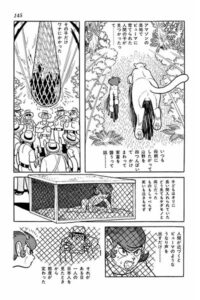Kibando (Manga)
Also known as 牙人 (Kibando)
| English Title: | Kibando |
| In English? | Yes [digital] |
| Japanese Title: | 牙人 Kibando |
| Type: | Ongoing Serial |
| Original run: | 1984/04/13 1984/05/18 1984/11/16 |
| Published in: | Weekly Shonen Champion 週刊少年チャンピオン |
| Published by: | Akita Shoten |
| Volumes: | 1 MT-308 |
Originally published on April 13, May 18, and November 16, 1984, Osamu Tezuka’s Kibando (1984) appeared sporadically in Weekly Shonen Champion. Although certainly off pace compared to the other great Tezuka series, such as The Rainbow Parakeet (1981-82) and Black Jack (1973-83) that appeared in the publication, Kibando (1984) remains a fun, if unfinished, little adventure story.
What it’s about
While traveling to the Amazon, Detective Futsuuno comes across a strange boy. Raised deep in the Amazon jungle by a puma, “Kibando” would follow his mother around on all fours, stealing livestock from local farms. When he’s captured they realize that, despite his savage appearance, he is, in fact just a human boy – albeit one who doesn’t laugh, cry or talk. Whenever anyone would approach him, he’d just growl like a puma… that is, until he meets Detective Futsuuno.
Calmed by his long “cat-like” whiskers of facial hair, Kibando takes an instant liking to the Japanese police officer. And so, it’s decided that Kibando should accompany Futsuuno back to Japan to try to re-integrate him into proper human society. However, being a police detective in Japan is a demanding job, and even though Kibando is more than eager to help – using his animal instincts and jungle-honed powers to help his adopted father fight crime… whether he wants the help or not – but it largely falls on his adopted sister, Namiko to be his social guide.
Of course, such a spectacle – a jungle boy in the heart of modern japan – brings with it a lot of attention, and a pair of newspaper reporters try to get the scoop.
However, despite the distractions and the challenges, little by little, Kibando’s adopted family and friends teach him what it means to be human.
What you should know
Osamu Tezuka was fascinated by the idea that human beings were simply just an extension of the animal kingdom, and as such, there is a kinship that should develop between the animal and human worlds.
One of the earliest, and easily most well known example of this is in Jungle Emperor (1950-54) – where the young lion cub, Leo is taken from his jungle home and brought to live amongst humans. He tries to adopt their ways, and then makes an effort to bring human civilization back to share with his animal friends – albeit with limited, but humourous results.
He also highlighted a similar relationship between human beings and wild animals in both Brave Dan (1962), and Bagi, The Boss of the Earth (1975-76).
Now, of course, the “human child being raised by animal” idea isn’t a new one. Mowgli was raised by wolves in The Jungle Book stories, and Tarzan was raised by apes… so why not a Puma?
In Kibando (1984), Tezuka revisits the tried-but-true theme, but instead of bringing his readers to the jungle, he brings the jungle (boy) to his readers, and sets the stories in the familiar setting of modern-day Japan. So, instead of just seeing the threat that human civilization poses to the natural world, at least in a small way he introduces a bit of that natural world as a counter-point to the modern one. In this way, Tezuka provides his readers with a bit of a wake-up call – and one that hits closer to home – that human beings should not forget that they are also part of the natural world.
What else you should check out
Check out the link below for chapter summaries and more detailed publication information on Kibando (1984) serialization in Weekly Shonen Champion.






Leave a Reply